I came across this article which I thought was well worth posting.
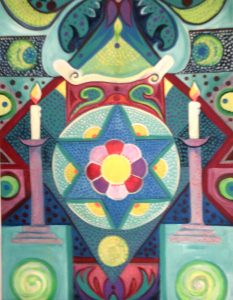
| When Will The Left Start Talking About Israeli Trauma? | |||
| 09.02.2016 , by Yakir Englander | |||
|
|||
I came across this article which I thought was well worth posting.

| When Will The Left Start Talking About Israeli Trauma? | |||
| 09.02.2016 , by Yakir Englander | |||
|
|||
Sociopaths are perhaps the most insidious of predators because their grooming involves sophisticated mind games that can target their victim’s sense of self and reduce them to a state of mental despair and desperation. Above all, the sociopath will often present as an interesting person with immense social skills and charm, but nothing could be further from the truth, sociopaths can be very dangerous.
The sociopath operates on facile and superficial charm. Sociopaths are highly manipulative con artists. They pretend to recognize the rights of others, but in effect they never do. They are self-serving and view their behavior as normal and acceptable.
Sociopaths are often romantics who draw their victims into their web with beautiful and poetic words, but beneath the feigned beauty, sociopaths are hostile and controlling. They view their victims as merely an instrument of domination and self-gratification. Ultimately the sociopath will act to humiliate their victim.
How to spot a sociopath.
The sociopath has a grandiose sense of self-importance. They have a sense of entitlement and ownership over other individuals and they do not like to be challenged.
Sociopaths engage in pathological lying and can often believe their own lies and/or they will refer to them as a plan or a vision. It is almost impossible to tell when a sociopath is lying because they do it on a consistent basis and they get caught up in the falsity of their own complex drama. These people are so convincing they can pass a lie detector test because they truly believe in their own powers and narratives.
The sociopath will have no shame or remorse. Inside the head of the sociopath there is a deep-seated rage, which is split off from the normal personality and repressed. The sociopath is an opportunist and will choose victims very carefully. With this in mind, the sociopath will not shy away from the well educated or successful person, rather, they will be attracted to them because the challenge and self-gratification is much greater.
The sociopath will always see the ends as justifying the means, they do not give up easily and they allow nothing to stand in their way. They can be very clever and persuasive. Once hooked, the victim finds it hard to escape.
The sociopath is very good at feigning emotions. They can show compassion and kindness and will frequently use love as an ulterior motive. They will make what appear to be sound and sincere promises, but on the inside, the sociopath is cold and calculating and they see no wrong in misleading their victims, in fact they delight in it because their victim has become their property.
Importantly, the sociopath has no capacity for love. Proclamations of love and trust are merely the tools the sociopath uses for stimulation. There is nothing genuine about the sociopath because they have lost touch with what it means to be a loving and caring human. Sociopaths are callous and feign empathy. They have only contempt for their victims and have no understanding of the pain they cause. Their aim is only to enslave their victim. From this enslavement the sociopath gains psychological and/or sexual reward, which in turn becomes an addiction.
Sociopaths find normal life boring so they tend to live on the edge. They can be both versatile and criminal, they are generally promiscuous and like taking risks. Sociopaths have poor behavior controls and can flip from being the nice person to being the dangerous one. Above all, sociopaths are very good at gaining your trust and attention and it becomes easy to make excuses for them.
The sociopath has no sense of boundaries and no concern for others. They are irresponsible, unreliable and they are oblivious to the damage they cause.
The sociopath has generally had a painful history of abuse, displacement or insecurity, which over time causes them to move away from realism. They can become authoritarian, secretive and paranoid and they have contempt for anyone who tries to help them.
Sociopaths rarely have to confront the law because they seek out the environments in which they can operate safely without detection. Sociopaths are hard to spot because they are generally very conventional.
The sociopath needs their victim’s love, respect and gratitude and will work hard to secure it, but always with despotic control. They groom their victims to satisfy their extreme narcissism and they will often use that energy to rise to other forms of personal power and achievement.
Finally, the sociopath operates with impunity on the social media platforms where there are few methods of detection and almost no consequences for the perpetrator of sociopathic crimes.
Further, identifying a sociopath is not easy. One needs to be vigilant and in tune with one’s instincts. If something does not feel right, then it probably is not right and the best advice would be to end the connection immediately.
Online Scammers.
Australians are losing millions of dollars to scammers according to figures in the Australian Competition and Consumer Commission (ACCC) Targeting Scams report. “Total combined losses reported to Scamwatch and other government agencies exceeded $489 million, $149 million more than in 2017 and they were expected to jump again to 532 million by the end of 2019… These record losses are likely just the tip of the iceberg. As the report suggests, “we know that not everyone who suffers a loss to a scammer reports it to a government agency.” In 2018, more than 378,000 scam reports were submitted to the ACCC’s Scamwatch, the Australian Cybercrime Online Reporting Network (ACORN) and other federal and state-based government agencies such as the Australian Taxation Office (ATO), of these dating and romance scams represented significant losses increasing from $42 million in 2017 to $60.5 million in 2018. Dating and romance scams are particularly insidious because they play on the most fundamental of human needs, love, caring and the desire for belonging.
Importantly, not all scammers are seeking money, sometimes it is sex or information they want and sometimes it is just the desire for control. In Australia there has been a rise in identity theft due to scamming. As a result, data is being collected on all forms of predatory behaviour as government’s try to protect their citizens, but the reality is the Internet is almost beyond regulation and there will always be victims of unethical and criminal behaviour. The stakes are high and the costs to individuals are immeasurable.
One of the main sources of scamming is social media. Not every contact made on social media will be a scammer, many good friendships can arise through being online, but social media has few boundaries and little or no accountability, so the best advice is to be sure you know who you are dealing with.
The Internet has literally dozens of sites warning about scammers and their activities, but people are still getting caught out. There is a very distinct profile which most rational people would easily recognize, but it is generally ignored because scammers are able to subvert rational evaluations by tapping into the human emotions and they are very skilled at selecting appropriate victims. For example, romance scammers will look through social media for people who are actively seeking a partner, or they will pick someone who appears to be alone. Scammers will frequently target older people who are likely to have superannuation tucked away somewhere and who probably have real estate and other assets. 54.8% of victims are female and 44% are male. Dating agencies and social media are the most common platforms used by scammers around the world and chat room scamming is fast becoming the norm.
The scammer will pretend to be a prospective companion, sometimes offering marriage, or a good friendship and he or she will aim to become your confident. Scammers are very good at using reverse psychology and emotional triggers. This is how it works:
Scammers will generally set up an appealing fake profile to lure victims into their virtual world. They will often present as trustworthy people, that is people of substance; doctors, lawyers, military personnel or other similar professions and, importantly, they may well be military personnel or people of similar rank. The scammer’s seduction can be crude or highly sophisticated depending on the target. There are no clear distinctions on who will become a scammer, similarly there is no clear profile describing their victims, just about anyone using the Internet is fair game. Scammers will almost certainly be living abroad, that is outside the country they choose to target. Distance is crucial to the scammer because it allows the perpetrator to believe she or he will not be caught.
Romance scammers will generally message you with compliments, they might tell you that they checked out your profile and you seem like an interesting person. Soon after, in a very short space of time, they may express deeper emotions for you. Sometimes they will move you away from messaging on social media and onto the more private email. Once the scammer has convinced you that he or she is genuine they will shower you with compliments and sometimes with gifts.
Scammers are very patient, they rarely give up, they can take months or even years to gain your trust. Once all your defenses are down the scammer will reveal his or her objective, it might be a request for financial help, for sex, explicit pictures or other. There is no age limit, scammers will target anyone who meets their criteria.
Scammers might embark on a plan to visit you, but they will never turn up. Some have been known to send money in small amounts and then to ask for more later. Once you have paid the amount of money they are seeking, you will not hear from them again.
At one point you might start to feel suspicious, but the scammer has planned for this and she or he will work more on your trust and deepening the relationship. Often the scammer becomes so proficient that they cannot see anything wrong in what they are doing. After all, you have been provided with some happy moments. Or, it may be that the scammer has listened and counselled you on your life world difficulties so they feel you are obliged to repay them. You may believe you have entered into a happy and seemingly healthy exchange but, you have not, you have entered a place of fantasy and virtual illusion. You will also find pulling back from this space is extremely difficult.
Sex on the Internet.
Over time, the scammer does not present as a villain, but as a friend or potential lover. You have never met this person and you are not likely to, but you feel reciprocating love will cause you no harm. Soon you find that Internet lovers are phantom lovers and they can run hot and cold, playing on your needs and desires when it suits them. One minute they are there for you and the next they are gone; this serves to deepen your emotions and heighten your basic needs for the scammer’s companionship.
Internet lovers generally use false identities and they will lie about their details. Some use more than one profile. You may be suspicious, but the chances are you will ignore your suspicions because your new friend is an appealing romantic and you like to see the best in people. You feel like you have found a good partner and someone who cares for you.
Soon you will realize that this friend knows everything about you and you know nothing about her or him. Somewhere along the line there might be a twinge of guilt from the perpetrator or he or she might feel you are on to something so they will work harder to make you think they are a good person and they really want to get to know you. However, try asking a scammer to meet you in person and you will be waiting a very long time. Online scammers do not meet up with their victims.
Scammers have all kinds of reasons for doing what they do, sometimes they are lonely, sometimes they are in pain, but scammers can also come with real dangers if they have criminal intent. They can use you as mules for money laundering or drugs and they can involve you in their illicit activities without you being fully aware of what is happening. In addition, scammers can lure their victims overseas and place them in physical danger of kidnap or terrorist activities, this is rare, but it does happen. Few governments will pay the ransom for kidnapped citizens, if this happens you are on your own.
Common Scammer Profiles.
Primary studies show that in most online relationships the predators are males cheating on their wives. The Internet has opened the flood gates on cheating in ways that may appear innocent. Many scammers and cheats do not think they are doing wrong because there is no human contact between parties. There are websites, chat rooms and messaging facilities that are devoted to making these connections easy and seemingly harmless and there are limited rules in place to protect users. Scammers and cheats generally have no remorse and their relationships are very easy to conceal.
Some online relationships are genuine and they can take place out of need, that is feelings of inadequacy or downright unhappiness, but it is hard to distinguish the good from the bad. Others can be instigated by a single or married person who just decides to play the field.
Most online connections start with friendship before becoming intimate and sexually explicit, but sexual stimulation and/or money seem to be the ultimate goals. There have been occasions where the scammer has seen the error of his or her ways and a good friendship has been established, but this is very unusual because the scammer has an addiction and without the appropriate help, they rarely change their behaviour.
In almost all cases the women who enter these relationships are unsuspecting and vulnerable and they can get seriously and emotionally hurt, but this is not a sign of weakness. Scammers do not just target those they perceive to be weak. In many cases strong, independent, self-determined women have fallen head first into a scammer’s deception. Scammers are very good at what they do, they know people and they can easily find the soft links in a person’s personality.
Scammers will invoke the need to be needed. Or, alternatively they will present as a person of strength and reliability. Scammers will talk a lot about trust and respect to captivate your interest and you will fall for it because you are an ethical and trustworthy person looking for a likeminded friend.
Online relationships always involve some form of emotional attachment often expressed in a deep sense of loving, caring or some form of admiration. Common insecurities that occur in offline relationships are easily placated in the online environment because no one has to take possession of the consequences. Talk is cheap and very effective. There are no secondary diversions so you are unlikely to tell anyone what is happening because you are feeling immersed in this new experience of love and caring, or perhaps you have shared more than you should have and you have a fear of being exposed.
Relationships can start and end at the click of a mouse and they usually do when the scammer has achieved what she or he set out to achieve. When this happens, the real emotional cost begins to set in.
The Emotional Cost.
The reality is this: The financial loses to scammers can be enormous, but the emotional costs can be much greater. I have been a therapist and counsellor for a number of years and I have worked with many people going through traumatic relationship break-ups, but the Internet has initiated a new kind of relationship breakdown where both the rules of engagement and the inevitable separation are very different.
Internet relationships can be equally complex and problematic as face to face relationships, but their termination can have longer and more devastating impacts, sometimes lasting months or even years. Online breakdowns are often more severe than the psychological traumas encountered in person to person relationships, simply because they have left the individual powerless, embarrassed, ashamed and in a virtual void. The victim is duped by a new medium, technology; over which there is little control and absolutely no recompense. Further, because the virtual world is closer to fantasy, it invokes the deepest levels of human consciousness (and the unconscious), often triggering the memory of old wounds.
People who have had this experience should not blame themselves, effective scammers are highly astute professionals, but they are also people who may have desperate needs themselves and with no help available they transfer their pain onto their innocent victims.
Waking up to the realization that you have been scammed on the Internet is like drowning is a pool of thick liquid. Normally, you would hit the waters and swim, but you cannot move out of this feeling of being frozen in time. You have experienced a totalizing cybernetic abjection; in other words, you are lost in space. However, blaming yourself or others never helps anyone! It is important to take stock and forgive. You can become back from this and forgiveness is always the best pathway to healing.
Importantly, those feeling the serious effects of scamming should seek help immediately. A broken online relationship can lead to depression and thoughts of suicide and there has been a rise in deaths across the world due to broken online connections.
A final word on scamming. Being scammed can arouse feelings of anger and retribution, but like the rest of us, scammers are human beings with human problems. Scamming is often the consequences of psychosocial issues that pervade consciousness and target those who appear better off. While scamming as a growing practice needs to be called to account, we should do so knowing that scammers can and do become rehabilitated. Ultimately, the scammer bears the burden of his or her actions, whether in the present or in the future. Nature has its own form of justice. All you need to do is heal yourself.
Scamming is a global problem beyond the laws of jurisprudence and ethical standards and it needs a new and global response that goes to the deepest levels of the scammer’s psyche and the pain experienced both by the scammer and the recipient. The world is a difficult place for many and it needs to be remembered that society creates its deviants and criminals. We are all partly responsible for the world we have shaped and manipulated and it up to each individual to change it.
Finally, I have finished my collection of twenty paintings on the Torah.
Thank you for your interest in my sacred art.
This collection of paintings is an attempt to trace my own Jewish identity through the wisdom of the Torah. The inspiration came at the end of 2018 when I gave up teaching to make Jewish scholarship my primary goal. Elements of my enquiry transported me back to my childhood in East London at a time when Jews were still being targeted with antisemitism. It reminded me of the pain of the Holocaust, which still lingered in many a household and it brought back the memory of my grandmother who sought and gained her strength through reading the Torah, turning to prayer and trusting in the Lord.
I have been an artist, writer, philosopher and psychotherapist, but scholarship occupies much of my time. I approach each aspect of my work from an interdisciplinary perspective. I trained as a painter in London with Kristin Berge, a pupil of Oscar Kokoschka and the Kokoschka School has had a great influence on my art, particularly in the use of colour. I also studied history and literature at London University before becoming employed in the production office of Sam Spiegel’s film company Horizon Pictures, where I gained patronage from the exiled Russian Baroness Maura Budberg. In the 1960s I transferred to South Africa and worked as an art director for the British company Gestetner. I exhibited my paintings in Johannesburg and taught at the local art school. I came to Australia in the 1970s and worked in my own company Wicca Productions as a graphic artist specialising in posters. Later I returned to university where I wrote my Masters theses in Psychoanalysis and Development and my Doctorate in Communications and Consciousness. I have since worked in art therapy and I have also produced a number of books on art, philosophy and mindfulness.
Currently, I live on a rural property, which I have refurbished as land for wildlife. I am an active environmentalist, an advocate of multifaith engagement and a worker for animal rights. I have been greatly blessed and my sacred art allows me to share my joys with others around me. I hope as you navigate this work you will gain the same pleasure from it as I have had in producing it. Shalom.
Here are the paintings.

Shabbat Candles.
Bal Shem Tov taught that in the flame of the candle one sees three levels of light. The dark light corresponds to the love of Israel, which in turn represents the soul clothed in a material body, the white light corresponds to the love of Torah and the aura corresponds to the love of God.
Every Friday evening, we gather in the sanctuary to welcome Shabbat with the light of God, the singing of our prayers and our hearts opened and filled with love. We turn pain into comfort and sadness into hope. We praise God for His goodness and ask for His mercy. We emerge from the world of sorrow and transform it into blessings and joy. Thus, we are remembered, healed and strengthened for the week ahead.
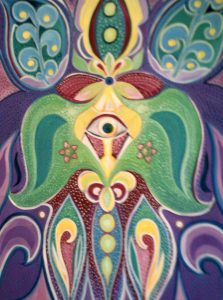
The Hamsa.
The Hamsa represents the Hand of God and it is sometimes known as the Hand of Miriam, a remarkable woman who is listed among the seven Jewish prophetesses. Miriam is a source of our strength. She was a guiding light when she waited by the bushes to watch over her little brother who had been placed in a basket floating among the reeds: And his sister stood from a distance to know what would happen to him (Exodus 2:4) “And she stood” – with Divine inspiration resting upon her. (Midrash – Mechilta d’Rabbi Yishmael).
We can all search for Divine inspiration. When we look to the sky, we see clouds. When we look beyond the clouds, we see the mystery that is the universe. When we look beyond the universe, we may not see the creator, but we can feel His presence in the miracle that is manifest in life and the everlasting consciousness of the soul. To know God is to know the life of love and happiness.
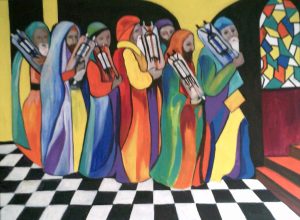
The Giving of the Torah.
Shavuot is a Jewish holiday which celebrates God’s giving of the Ten Commandments now contained in the Torah. Moses, ascended to the top of the mountain to meet with God, who gave him the Commandments, a moral code which was inscribed onto two stone tablets. The Torah has given us our moral code for a happy and fulfilling life. Further, the Torah binds us and gives us strength to face the perils of an uncertain world. …and you will return to the Lord, your God, with all your heart and with all your soul, and you will listen to His voice according to all that I am commanding you this day, you and your children. (Deuteronomy 30 x 2.)
We are never alone. When times are difficult, we can always turn to our maker for comfort and for those who say God does not listen to prayers, we are given the intellect to listen to our own voice and to be actors on our own behalf. God is everywhere. God is manifest in the silence of every deliberation.

Genesis.
In the teachings of Ba’al Shem Tov every letter of the Hebrew alphabet exists in three dimensions; worlds, souls and divinity, otherwise the world as we know it, the spiritual as we experience it and God who oversees everything and every new beginning. How does the artist capture the essence of every beginning? We awake in the morning with a song and a prayer. Your word is a lamp to my feet and a light for my path. (Psalms 119:105). The artist makes art to be at the centre of religious thinking and believing. In every stroke of the brush there is breath, and in every breath, there is life, and in every life, there is God the creator and none can truly deny Him, else the stars are an illusion, the sun fails to rise and the moon has fallen from the sky.
Eden.
The Garden of Eden is also called Paradise. It is the Garden of God described in the Book of Genesis and the Book of Ezekiel. A man was placed in the garden and he was free to eat from any tree in the garden except from the tree of the knowledge of good and evil, but the man and a woman were seduced by the serpent and they ate the fruit from the tree of knowledge. How we humans have eaten from the forbidden fruits! How we continue to do so in mindless destruction! We have killed the tree of life and we have eroded the Earth that sustains us. Our planet was given in love and we have treated it with greed and contempt. Now we must seek redemption if we are to maintain human existence. In love, there is always redemption.
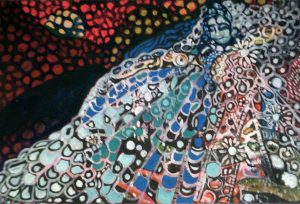
The Birth of Adam.
In his commentary on the story of Adam and Eve Rabbi Avraham Ibn Ezra states that Adam is the secret of the brain and Eve is the secret of the heart. Adam and Eve are the prototype forces of giving and receiving.
We are given bountiful gifts for which we must display ongoing gratitude and praise to our God. To give to another stimulates the mirror neurons in the human brain from which we derive the chemistry of happiness. To give and to receive are the rules of our co-existence, our sustenance and our satisfaction. Giving lengthens our life on Earth and assures our entry into God’s Paradise. To give with love and to receive with gratitude are the fabric of peaceful communities. When one cannot give, the acquiescence of life is lost. Life comes from life; love comes from love. Be at one with the universe, be at home with our God, be happy in giving and creating.
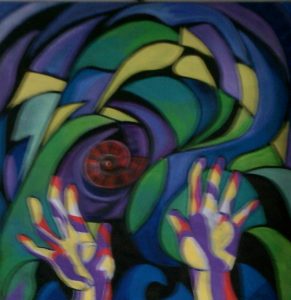
The Flood.
“And the Rain was upon the earth for forty days and forty nights” (Genesis 7-12). The function of water as a means of renewal is manifest in the Mikvah. Likewise, when the purifying waters fall on the planet it allows for a cleansing and renewal of the Earth. As we bathe in the tears of angels, we cleanse the body and rejuvenate the mind so we must not pollute the waters, else everything becomes decadent and polluted.
We are born from the waters of the womb and we connect back to the womb with our emotions. When life is a burden, we can renew our birth in the Holy waters.

Moses and Miriam.
When Moses was born, happiness and light filled the house for three months. Then the Egyptian officials came to Amram’s house forcing the family to put Moses in a basket and leave him floating on the Nile. How God saves us! As a young girl Miriam put herself at risk by waiting at the reeds, watching to see how God would keep His promise. We are reminded of the necessary ingredients for redemption. Every day we must redeem our trust in God and move forward with courage and commitment. Every day we must consider those who are less fortunate. Every day we must offer a hand of friendship to those who feel displaced and who are floating in the abyss of unknowingness.

Zipporah.
Moses killed an Egyptian who was striking a Hebrew and was forced to flee for his life. When he arrived in Midian, Moses sat by a well watching as Reuel’s daughters came to water their father’s flocks. Other shepherds arrived and drove the girls away so they could water their own flocks first. Moses defended the girls, so their father gave Moses one of his daughters, Zipporah as his wife (Exodus 2:11-21). Why did Reuel give away his daughter? Is it not better to marry a good man who cares for a woman than to marry through impulse and infatuation? Zipporah teaches us that life is a series of lessons learned over time. She teaches us that love which grows like a small sapling becomes a strong tree. She teaches us that wisdom does not come overnight, it must be acquired through struggle, pain and experience. Without the difficult times we would never know the good. Torah guides us, but in the end, we are responsible for our own thoughts and actions. Think love.
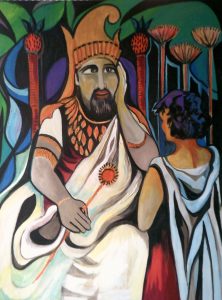
Joseph and the Pharaoh.
In the Torah, Joseph is sold into slavery by his jealous brothers, but he made good and rose to become the second most powerful man in Egypt next to the Pharaoh (Genesis 37-50). What do we learn from Joseph? Joseph’s life was filled with untold suffering, but he stayed faithful to God’s Commandments and eventually found favour with his master, but this did not protect him. Joseph had to learn that doing the right thing did not always have the best outcome and only God can be the true judge of what is appropriate.
Joseph teaches us forgiveness, not just the need to forgive others, but also to forgive ourselves. Forgiveness eases the pain of being hurt. Forgiveness removes animosity and it channels the more acquiescent areas of the brain so our minds can think clearly and productively. God forgives us our sins and here is the lesson for us to forgive others.
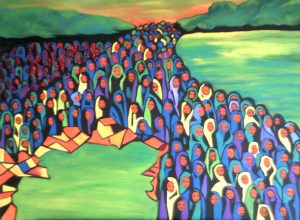
Exodus.
The freedom of the soul is the daily experience of the exodus from Egypt. “Hear of Israel, the God is our God, the God is one” (Deuteronomy 6:4). To hear is to understand and to transcend the confines of one’s own thoughts in the service of the Divine. In doing so we are not the captives of our desires. We have laws to guide us, but the sincerity in carrying them out must come from our hearts. We must know goodness and differentiate it from our habitual thoughts and longings. Goodness has its own unique dynamics and when we know goodness as a spontaneous trait, we fulfil our true aspirations. A life built upon personal gain and competitiveness only is not a wholistic and satisfying life. Pray for goodness, pray for strength and endurance. Our God hears us.
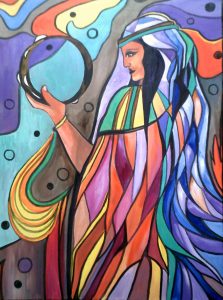
Miriam the Prophetess.
The Torah refers to Miriam as the Prophetess. She is viewed alongside Moses and Aaron when delivering the Jews from exile in Egypt: “For I brought you up out of the land of Egypt and redeemed you from the house of slavery, and I sent before you Moses, Aaron, and Miriam”(Exodus 15-20). Miriam is the music maker, the dancer and the creative force within all of us. She sustains our need for attention and love through pleasure and creativity. In creativity life blossoms. Creativity provides us with mindfulness. It slows down the thinking processes, settles the mind, eases the breathing and takes pressure of the body’s vital organs. Miriam teaches us to lighten the burdens in our life and to take everything as it comes with careful thought, love and responsibility.

The Burning Bush.
God told Moses, “Take off your sandals, for the place where you are standing is holy ground.” (Exodus 3-5). Moses humbled himself before God. The flames of the burning bush never consume the plant. This reminds us that the fire in our lives need not be disastrous. Fire is energy with good and bad uses. Fire keeps us warm on cold winter nights, it can also send a signal of danger. Fire reminds us not to be complacent. We should never take things for granted. Everything can change in a heartbeat. With trust in God change need not concern us. If we move forward with faith, life becomes a lot easier. “Those who know your name trust in you, for you, LORD, have never forsaken those who seek you.” “Be still, and know that I am God. I will be exalted among the nations, I will be exalted in the earth!” … Do not be afraid; do not be discouraged, for the LORD your God will be with you wherever you go.”(Psalm 19.10).
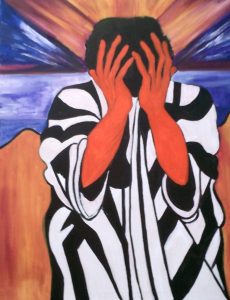
Prayer.
Prayer is the experience of the soul. Prayer is our private sanctuary, we must honour it, keep it safe and use it as often as we can. Prayer can help settle our mind and heal our pain and suffering. Prayer can happen in many forms and in many places, sometimes it is just a very private conversation with God who allows us to ask questions and to argue with him. In this way the dialogue is a process of building trust in God and in ourselves. The morning prayer lightens the day. “I thank you, living and enduring king, for You have graciously returned my soul within me. Great is your faithfulness”. Begin the day with a prayer and happiness will find you.

The Golden Calf.
The Golden Calf was an idol made by the Israelites when Moses went up to Mount Sinai. In Hebrew, the incident is known as ḥēṭ’ ha‘ēggel (חֵטְא הַעֵגֶּל) or the Sin of the Calf (Exodus 32:4). We are all prone to idolatry at times and it takes many forms. The Golden Calf reminds us to take a step back and evaluate what is on offer and what is of value. We must not lose sight of our trust in God. Fear can cause us to make bad decisions. Be sure that God watches over us. Moses burnt the golden calf in a fire, ground it to powder, scattered it on water, and forced the Israelites to drink it. When Moses asked him, Aaron admitted collecting the gold, and throwing it into the fire, and said it came out as a calf (Exodus 32:21-24). Transform in goodness because when we put our trust in God we can move forward with a clear mind and sound judgement.

Rachael and Leah.
Rachel was Jacob’s first love and Leah was the first wife that Jacob actually married and the first to bear his children. Leah, the unloved wife, took consolation in also bearing Jacob’s children and she had deep feelings of sisterhood for Rachel. Leah prayed for Rachael to have a child who is female so that she too had her allotted share in the tribes of Israel. From this relationship we learn that giving has its own rewards. Jacob loved Rachel. And he said, “I will serve you seven years for your younger daughter Rachel.” 19 Laban said, “It is better that I give her to you than that I should give her to any other man; stay with me.” So Jacob served seven years for Rachel, and they seemed to him but a few days because of the love he had for her.(Genesis 20.19).
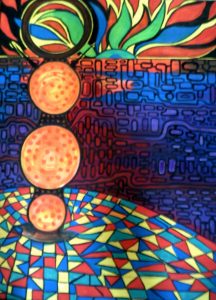
Temple Dreaming.
The City of Jerusalem has a long history during which it has been attacked 52 times, captured and recaptured 44 times, besieged 23 times, and destroyed twice. What can we learn from this? Perhaps we learn that the subject always wants what the other has. We must liberate from possessiveness before it takes control of our being. We must curtail the ensuring violence. My Jerusalem Dreaming represents the desire for peace, knowing that the road is littered with many obstacles. The Jerusalem Temple serves three faiths and it stands in the realms of possibility that one day an interfaith movement will conquer prejudice. Do you not know that you are God’s temple and that God’s Spirit dwells in you? (1 Corinthians 3:16 ).
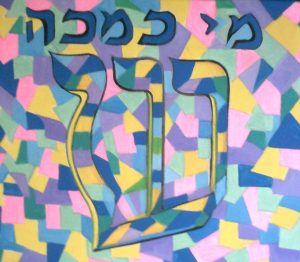
Who is Like You?
The Hebrew letter shin represents the Devine Revelation. The three heads point to the eternal flame. The three can also represent the two seeing eyes and the spiritual third eye, brought together in stillness and prayer. Who is like You O God among the gods that are worshipped? Who is like you, majestic in holiness, awesome in splendour, working wonders? Your children witnessed your sovereignty, the sea splitting before Moses and Miriam, “Tis our God”, they cried, “Adonai will reign for ever and ever!” (Exodus 15:11:2:18).
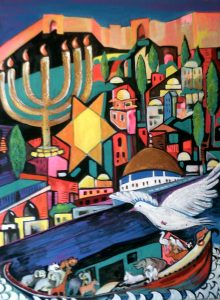
The Holy City.
We believe that God creates everything in the universe afresh in every single second. In the Uncertainty Principle, formulated by Werner Heisenberg in 1927 the position of a particle and its future location become less well known. Further, precise knowledge of a particle’s motion hinders knowledge of its present location. How then do we locate God when God is simultaneously in one place as well as being everywhere else? We locate God in our hearts and minds. We trust in his love and judgements. Everlasting love. You offered your people Israel by teaching us Torah and mitzvot, laws and precepts. Therefore, Adonai our God. When we lie down and when we rise up, we will meditate on Your laws and Your commandments. We will rejoice in your Torah for ever. (Mishkan T’filah,p32).

King David.
When King David ascended to the throne, he always kept his harp beside him. Every night at midnight, a slight breeze used to pluck at the strings and King David would wake from his sleep, rise from his couch and compose sweet, sacred songs in praise of God. The songs are called the Psalms of David. May
________________________________________________________________
1 Praise ye the Lord. Praise the Lord, O my soul.
2 While I live will I praise the Lord: I will sing praises unto my God while I have any being.
3 Put not your trust in princes, nor in the son of man, in whom there is no help.
4 His breath goeth forth, he returneth to his earth; in that very day his thoughts perish.
5 Happy is he that hath the God of Jacob for his help, whose hope is in the Lord his God:
6 Which made heaven, and earth, the sea, and all that therein is: which keepeth truth for ever:
7 Which executeth judgment for the oppressed: which giveth food to the hungry. The Lord looseth the prisoners:
8 The Lord openeth the eyes of the blind: the Lord raiseth them that are bowed down: the Lord loveth the righteous:
9 The Lord preserveth the strangers; he relieveth the fatherless and widow: but the way of the wicked he turneth upside down.
10 The Lord shall reign for ever, even thy God, O Zion, unto all generations. Praise ye the Lord. Psalm 146.
Shema
| Sh’ma Yisra’eil Adonai Eloheinu Adonai echad. Hear, Israel, the Lord is our God, the Lord is One. |
|
| Barukh sheim k’vod malkhuto l’olam va’ed. Blessed be the Name of His glorious kingdom for ever and ever. |
|
| V’ahav’ta eit Adonai Elohekha b’khol l’vav’kha uv’khol naf’sh’kha uv’khol m’odekha. And you shall love the Lord your God with all your heart and with all your soul and with all your might. |
|
| V’hayu had’varim ha’eileh asher anokhi m’tzav’kha hayom al l’vavekha. And these words that I command you today shall be in your heart. |
|
| V’shinan’tam l’vanekha v’dibar’ta bam And you shall teach them diligently to your children, and you shall speak of them |
|
| b’shiv’t’kha b’veitekha uv’lekh’t’kha vaderekh uv’shakh’b’kha uv’kumekha when you sit at home, and when you walk along the way, and when you lie down and when you rise up. |
|
| Uk’shar’tam l’ot al yadekha v’hayu l’totafot bein einekha. And you shall bind them as a sign on your hand, and they shall be for frontlets between your eyes. |
|
| Ukh’tav’tam al m’zuzot beitekha uvish’arekha. And you shall write them on the doorposts of your house and on your gates.
|
|

I have been having a heated discussion on Facebook over the demonstrations by Hasidim against the Eurovision Song Contest being performed on the Sabbath in Israel. My view has always been that if you visit a country you abide by the laws and customs. Pending the Eurovision event, the criticism of Israel over its religious laws by the west has been astounding.
What really prompted the Facebook discussion was a picture of three women who stripped down to their bras to cause the Hasidim to turn away. The Hasidim did turn away, from my view, as a mark of respect. From the view of others, they turned because of religious convention. Both might be true, however, the point for me was how much respect did the women have for the Hasidim? None! Moreover, how much respect did they have for themselves? Modesty not being a popular trait these days! Anyway, to cut a long story short, the discussion on Facebook turned one about the separation of powers, a discussion, which has turned into outright hatred for any form of religious belief. Where is the balance? I ask myself. Here is my response. 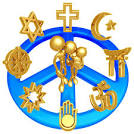 To the writer of the post on Facebook.
To the writer of the post on Facebook.
Some time ago I would have agreed with you on the separation of powers, but now (…)??? Take a look at our secular world, where is the morality, where is the care for others? Even our language has changed from prose to outright assault. The more the institutions grow, the more power they have and the more likelihood of corruption and abuse, that applies to religions and secularism. We cannot say one is better than the other!
The argument for democracy against theocracy is skewed. How many wars have been fought in the name of democracy? Further, religion is defined as a belief system, hence atheism is classified as a religion, as is science, by many postmodern theorists. Today, thanks to Derrida we have different ways of examining things, instead of asking what is right and what is wrong with institutions we ask where is each institution right and wrong.
There are many good religious people. The fundamentals of religion are based on goodness. What people do in the name of religion is another issue. There is very little in secularism to unify people the way religious belief does and there is a very basic reason that this. Religion lifts us from the day to day experience in order to look at things from another perspective. The French philosopher Blanchot wrote that in language it is not the words that give the sentence meaning, it is the spaces in between. If we removed all the spaces then what we would have would be a language of confusion; gobbledygook! The same applies to the place of religion in the social order. It gives us space to reflect, to praise and to better evaluate. Religion does not need a figurehead (as in Christianity) to many God, Allah and Adoni are simply the force that created the universe and gave us a space to live within it, all others are prophets and teachers.
Don’t you think if we had more respect for this universal power, we might also have better respect for our planet and all the creatures that live on it? Religion provides hope and we cannot give up on hope.
________________________________________________________________
Space on Facebook is of course very limited for such a discussion, but I am dismayed at the way so much hatred is being generated against those who have beliefs extending beyond the personal or the political. We need to believe that a better world is possible, if we don’t what else is there? Those who condemn religion per se, have not looked closely at the demands of the New Age Movement, which in and of itself, is a religion and a signifier that some kind of transcendent is needed.
I feel well within my field of experience to write on the topic of revolution because many years ago I called myself a revolutionary. As part of a youthful cohort of the 1960s anti-war demonstrations I and my fellow demonstrators were all revolutionaries, a name which may have been adopted, not from the struggle, but from the popular Beatles record that alluded to Revolution.
The fact is revolutions give rise to the same power relations that the Capitalist Revolution gave rise to in the first place, the roots of which were sown in the eighteenth century Enlightenment. The internal logic of capitalism is deeply rooted in modernity and its ideology and the related problems are not just current they are historical.
The trend today, is peaceful protest modelled on the activism of Gandhi and Martin Luther King. The demonstrations however, rarely end in peace. Gandhi’s demonstrations led to the massacre of 400 innocent Indians by the British who sought revenge for the insurgent sit-ins. Martin Luther King, had a vision, but it did not calculate the violence carried out against demonstrating black Americans, which escalated and continues to escalate, rather than being curtailed. Brave leaders are often beguiled by the moments of elation, which seem to far outweigh the human costs. There is a price to pay for protest and while some say these costs are needed for progress, I believe there is a better way.
I am not against peaceful protest we have a democratic right to do so. However, if protesters break the law then they are dismantling the very legal system they need to make the specified changes. When I trained in passive resistance many years ago, we were taught not to provoke the authorities. When asked to move on we moved on. Of course, people came back the next day and the day after, so on and so forth, but civil obedience and the law actually remained in-tact. It was called middle class radicalism, because it made a point without tampering with foundations of the socio-judicial system. Certainly, today those same foundations need to be changed, and they do slowly evolve, but they will not be altered with violent rebellion, on the contrary they are likely to be strengthened by the constant need to justify judicial authority.
I have attended recent protests as an observer and what I have noticed is an increase in violence on both sides. Protesters aim for peace, but when they refuse to move, it allows the police to use reasonable force to shift them. Here is where the violence begins and it ends with numerous people being arrested. There is no sense to this, it simply works in favour of giving the authorities more weapons and more power to use against protesters. Further, while most protest groups aim to cover the cost of court appearances and fines, this also reduces the resources of the campaigners. Many a protest group has been undermined by having resources diminished this way, while others who may have secured government funding, under the democratic principle of having a voice, generally lose it.
As a long-time peace activist, I abhor violence in any form. Violence is not civilized and cannot be passed off as such. We have mechanisms for reform, they might be tedious, but there is a better chance of long-term change via the rule of law than from ongoing civil disruption of society.
The campaigners for civil disobedience today are generally focused on Climate Change. My question here is this, how many campaigners actually work to reduce their carbon footprint when the focus groups are not around? I would guess many do change their lifestyle and many more do not. Similarly, research has shown that many people join protests for the connection not the cause. This is not to say that protesters cannot glean knowledge from other protesters. Nonetheless, ongoing commitment is a hard road to follow.
We live in a mass consumer culture and Climate Change is as much a cultural problem as it is a consumer one. Changing an embedded culture takes time. We have little time to make the changes needed and I accept the limits of truly passive action. It would appear we have two choices. Either, we take responsibility for our own consumption and ethics in relation to the world’s environmental dilemmas or we wait for the entire system to collapse. A positive result requires commitment from everyone at home and abroad. Small steps like recycling plastics can go a long way if everyone participates and there are many more positive ways to help. The mass movement has its place, but we all need to take individual responsibility. Moreover, times are not going to be easy and we need to help others as well. People matter, we should not be putting them at further risk.
My non-Jewish colleagues are often surprised at my defence of the Jewish people and they ask why? My answer goes beyond my own roots to the medium of scholarship and integrity. The Jews are much maligned and I believe, unjustly so.
Two comments were made to me this week and I shall call them misunderstandings rather than malicious and derogatory statements. The first, was that all Jews are fascists. This was no doubt based on the perception that Jews are persecuting the Palestinian people. I will not go into the arguments relating to the Jewish- Palestine struggle as I have posted these elsewhere. However, I do take issue with the word “fascist”, which for Jewish people, who have endured so much pain at the hands of fascists, is a painful and unwarranted insult. Suffice to say, Israel is a democracy, fascists states are not.
The other issue pertains to the belief that because the Bible mentions the Jews as the Chosen People, Jews themselves think they are above the rest. Nothing could be further from the truth, the Chosen People statement has been grossly misinterpreted. The Jews were given the Torah and more laws than most could hope to abide by, 316 I recollect. The Jews made it their aim to spread goodness to others because God had been good to them. He liberated them from slavery. In history, this liberation is a direct result of the agreement with God. Notwithstanding, this agreement appears to have rendered Jews the victims of an intense jealousy and hatred and I have met many Jews who believe this is because they have sinned and not lived up to the Commandments. What a sad state of affairs! We all know the debilitating affects of a perceived failure. Jews are not the evil people they are made out to be in the rank propaganda and speech hate that prevails such accusations of being fascists and above others.
No nation has ever been hated more for being bestowed with a system of laws and justice than the Jewish nation. Yet, most Jews continue to give of themselves in ways that few know of or acknowledge because giving is an integral part of being Jewish. Concomitantly, in giving to its neighbours, Israel has found itself in a position of having to continually defend its borders against hostilities because any concessions have been treated with contempt by a population whose leaders serve their own interests. Jews are not hostile to Arabs, indeed Israeli Arabs appear to live better than those in Palestine.
It is public knowledge that some people want to see the end to the Jewish State and, in some cases, the Jewish people; this is nothing new. The Jews are survivors and I am sure that irritates some of Israels’ enemies, but those who protest against Israel and the Jews might consider some of the great Jewish minds and creators that have given much to the world. Jews have achieved in science, medicine, the arts and much more and the world has benefited.
It is a fact that those nations that embrace the Jewish intellect tend to thrive and they do so because next to God Jews value integrity, learning and giving. There are good and bad people in every race, nation, group and community, but to single out Jews as fascist and thinking themselves above the rest is anti-Semitic and racist.
I hope I have made my point!
 Picture courtesy of Reform Judaism.org.
Picture courtesy of Reform Judaism.org.
With elections in Australia pending, I was prompted to think about what it means to live in a country espousing national self-determination. Taking the American Declaration of Independence (Australia’s nearest facsimile on Rights) as an example one reads, “that all men are created equal, that they are endowed by their Creator with certain unalienable rights, that among these are Life, Liberty and the pursuit of Happiness”. This Declaration assumes that all men (and today, all women) are rational human beings, thus they can create any form of government they wish, be it Communist, Fascist, Christian, Islamic, theocratic, whatever. This doctrine has set out the principles of normal democracy and political freedoms, but not all governments share the same meaning of normal democracy. Thomas Jefferson, for example, understood the Declaration as containing certain norms that also enabled governments without consent, to govern over ethnic groups in a manner that denied self-determination. This brings to mind the view held by John Stuart Mill in his work On Liberty, Mill writes:
“Despotism is a legitimate form of government in dealing with barbarians, provided the end be their improvement and the means justified by actually effecting that end”. [1]
Few people would agree with this today and it follows that for some governments the right to self-determination is not absolute. A case in point being Israel, a nation that has been accused of preventing self-determination to the Palestinians and hence invoking an ensuing struggle over who has rights to the territory known as the West Bank. Once again, some clarity is needed since there is a significant Arab vote in Israel that keeps the system in play. Why? Because most Jews and Arabs want peace.
The West Bank is the Biblical land of Judea and Samaria. When the First World War ended, thus ending the Turkish Empire, the allied powers signed an international treaty known as the Mandate for Palestine. In the context of the League of Nations (now the United Nations) this Mandate was recorded as international Law. This document formalised in the Balfour Declaration, acknowledged the Jewish people as the rightful descendants of Palestine, which in turn, provided grounds for establishing a Jewish homeland (Jewish State). Civil and religious rights in Palestine were still guaranteed to non-Jews, but at no time were Arabs, Christians or any other non-Jews recognised as having rights to any part of Palestine. The Mandate for Palestine remains valid in International Law today.
Following John Stuart Mill’s definition of normal democracy and the International Mandate, Israel’s government is fully within its rights to govern over all of Palestine and it might have done so following Israel’s victory in the Six Day War. However, this was not the case, Israel chose contemporary normless democracy leading everyone to believe that the democratic principle should allow Palestine the right to independent statehood. The problem is the Arab states do not believe in democracy.
Israel faces a double bind that harks back to the words of the prophets. Isaiah prophesies that in “the end of days”, Israel will be ruled by fools, by a government so deranged that it calls evil good and good evil (3-4, 5-20, 44-25). Both the Mishna and Talmud concur with this view. The Middle East is wrought with the clash of civilisations and a scenario that is not new. We have seen the massive destruction of ancient buildings and cultures across the Arab world, to what avail? What if Jerusalem was to be once again levelled to the ground?
For devout Jews, the news is not all bad. According to Rabbi Akiva, the destruction of Temple Mount will lead to Redemption, (the three most important components of Judaism are Creation, Revelation and Redemption). However, we as global citizens should view this as a serious dilemma. This struggle is much more than a squabble between brothers. The destruction of people and places is part of a much bigger picture pertaining to what, we as humans are doing to the planet and its treasures. War is the greatest form of pollution and the ultimate form of global destruction. Before any kind of self-determination comes unity. Without unity there is little hope of survival, be we Jews, Gentiles or Arabs,
[1] John Stuart Mill On Liberty
.